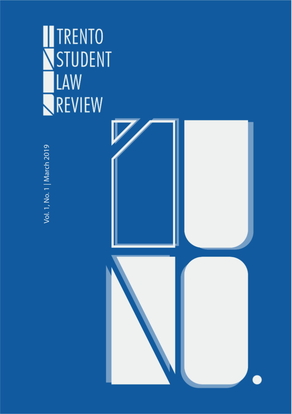Politicization of a Future International Investment Tribunal's Appointment and How to Avoid It
DOI:
https://doi.org/10.15168/tslr.v1i1.244Keywords:
Investor-State Dispute Settlement, Investment Arbitration Appeal Mechanism, Permanent Investment Tribunal, Composition and Election, Independence and ImpartialityAbstract
In 1965, the World Bank promoted the Convention on the Settlement of Investment Disputes between States and Nationals of Other States (ICSID Convention) with the aim of filtering any political and diplomatic influence out of international investment disputes. This aim was achieved by lending several features from commercial arbitration. Today, after a successful launch phase of the Convention's mechanism, the benefit of the current investor-state dispute settlement system is de-bated. Lack of legitimacy, interference with the states' right to regulate in the public interest and doubts about the arbitrator's impartiality are some examples of the most frequently voiced concerns. Several different solutions, reaching from an investment court under the CETA for the EU-Canadian disputes to a truly multilateral court available to an open number of states, have been put forward. Most of the suggested roads leading out of the ISDS crisis provide for the establishment of a standing court. Scholars primarily argue that those models bear the risk of re-politicizing the controversies. This essay assesses, based on a comparative approach, whether the concern of re-politicization is justified. For such purpose, it focuses on the areas that are particularly threatened by apossible interference of the states' political powers: the appointment ofthe judges and their independence and impartiality requirements. The outcome of the analysis does not promise well for the future investment court. The experience of other standing courts and tribunals show that a certain degree of political influence cannot be excluded. It would rather seem that the states do not even wish to create a completely depoliticized system. In addition, as this study shows, an investment court could also widen the room for judges to introduce their political beliefs into the decision-making process.
References
Emma Rose Bienvenu, The EC’s Proposal for a Permanent Investment Court System: Politics, Pitfalls, and Perils (2017) <http://pennjil.com/the-ecs-proposal-for-a-permanent-investment-court-system-politics-pitfalls-and-perils/> accessed on September 10, 2018
Charles H Bower II, Obstacles and Pathways to Consideration of the Public Interest in Investment Treaty Disputes, Yearbook on International Investment Law and Policy 2008–2009 347 (2009)
Nicolette Butler, Surya Subedi, The Future of International Investment Regulation: Towards a World Investment Organisation? 64 Neth Int Law Rev 43 (2017)
See Susan D. Franck, The Legitimacy Crisis in Investment Treaty Arbitration: Privatizing Public International Law Through Inconsistent Decisions, 73 Fordham L Rev. 1521 (2005)
Charity L. Goodman, Uncharted Waters: Financial Crisis and Enforcement of ICSID Awards in Argentina, 28 U Pa J Int’l L 449 (2007)
Gabrielle Kaufmann-Kohler and Michele Potestà, Can the Mauritius Convention serve as a model for the reform of investor-State arbitration in connection with the introduction of a permanent investment tribunal or an appeal mechanism?, CIDS Research Paper (2016)
Gabrielle Kaufmann-Kohler, Michele Potestà, The Composition of a Multilateral Investment Court and of an Appeal Mechanism for Investment Awards CIDS Supplemental Report (2017)
Alex Mills, The Balancing (and Unbalancing?) of Interests in International Investment Law and Arbitration, in Zachary Douglas, Joost Pauwelyn, and Jorge E Vinuales, eds, The Foundations of International Investment Law: Bringing Theory into Practice 409 (Oxford 2014)
Hersch Lauterpacht, The Function of Law in the International Community (Oxford 2011)
Ibironke T Odumosu, The Law and Politics of Engaging Resistance in Investment Dispute Settlement, 26 Penn St Int’l Law Rev 251 (2007)
Eric A Posner and Miguel FP de Figueiredo, Is the International Court of Justice Biased?, 34 The Journal of Legal Studies (2005)
Anthea Roberts, UNCITRAL and ISDS Reform: Pluralism and the Plurilateral Investment Court, (2017) <https://www.ejiltalk.org/uncitral-and-isds-reform-pluralism-and-the-plurilateral-investment-court/> accessed on September 10, 2018
Catherine A Rogers, The Politics of International Investment Arbitration, 12 SCIRL 223 (2013)
Cesare PR Romano, Karen J Alter, and Yuval Shany, The Oxford Handbook of International Adjudication (Oxford 2014)
Jeswald W. Salacuse, The Law of Investment Treaties (Oxford 2015)
William A Schabas and Shannonbrooke Murphy, Research Handbook on International Courts and Tribunals (Edward Elgar Publishing 2017)
Ibrahim FI Shihata, Towards a Greater Depoliticization of Investment Disputes: The Roles of ICSID and MIGA, 1 ICSID Rev 1 (1986)
David A Soley, ICSID Implementation: An Effective Alternative to International Conflict, 19 Int Lawyer 521 (1985)
Catharine Titi, The European Union’s Proposal for an International Investment Court: Significance, Innovations and Challenges Ahead (2017) TDM
Gus Van Harten, A Case for an International Investment Court, SIEL Inaugural Conference 2008 Paper (2008)
Erik Voeten, The Politics of International Judicial Appointments: Evidence from the European Court of Human Rights 9 CJIL 669 (2009)
Eduardo Zuleta, The Challenges of Creating a Standing International Investment Court TDM (2014)
Downloads
Published
How to Cite
Issue
Section
License
The copyright on the texts published in the Trento Student Law Review remains with the respective owners. The journal allows authors to retain publishing rights without restrictions.
The Trento Student Law Review is distributed under a Creative Commons license Attribution - Noncommercial - Share-alike 4.0 International (CC BY-NC-SA 4.0).





